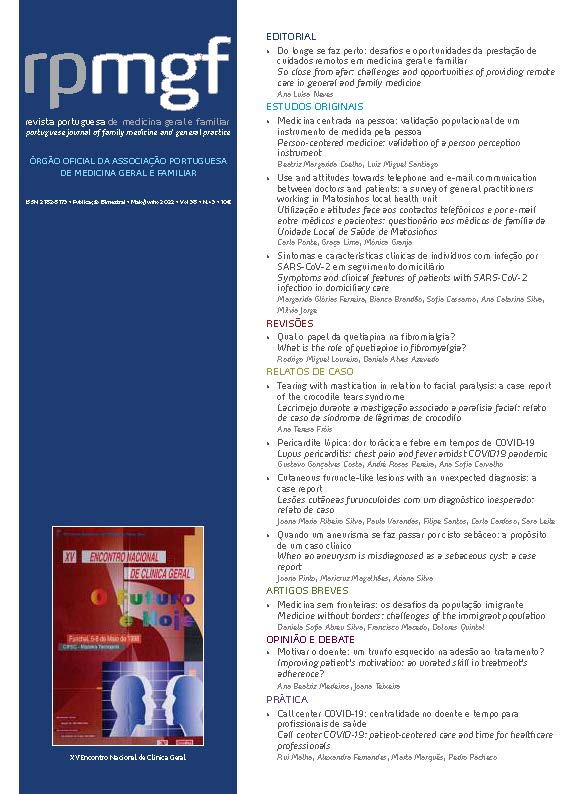Improving patient’s motivation: an unrated skill in treatment’s adherence?
DOI:
https://doi.org/10.32385/rpmgf.v38i3.13325Keywords:
Motivation, Motivational interviewing, Treatment adherenceAbstract
A patient's motivation has known implications for the process of therapeutic’s adherence. In clinical practice, the patient’s weak motivation difficults his proactivity. Consequently, it interferes negatively with behaviours such as compliance with medication or adoption of healthy lifestyles, impairing the approach to various chronic pathologies. In general, studies reveal that patient motivation is a concept widely used by health professionals, albeit with an imprecise definition. Mostly, it is seen as a characteristic trait, translating into the dichotomy between motivated patients/and unmotivated patients, with a bias towards the second categorization. This perspective places the capacity for change only on the patient's side, with negative consequences for both actors in the doctor-patient relationship. However, since the publication of the Motivational Interviewing Model, in the 1980s, specific techniques have been documented to assess patients' motivational status, in order to modify them. Traditionally applied to substance use disorders, these models have shown benefit in several chronic illnesses’ rehabilitative programs. Understanding a patient’s motivational state as a dynamic path, permeable to external modification and subject to control by the health professional, combined with the training of skills in this area, can improve prognoses, increase patients’ and health professional’s satisfaction, and reduce health systems’ costs.
Downloads
References
Correas Lauffer J. Prazer e recompensa: os mecanismos da motivação. Atlântico Press; 2019. ISBN 9789898965684
Volkow ND, Wise RA, Baler R. The dopamine motive system: implications for drug and food addiction. Nat Rev Neurosci. 2017;18(12):741-52.
Magrì E. Emotions, motivation, and character: a phenomenological perspective. Husserl Stud. 2018;34(3):229-45.
McCarron TL, Noseworthy T, Moffat K, Wilkinson G, Zelinsky S, White D, et al. Understanding the motivations of patients: a co-designed project to understand the factors behind patient engagement. Health Expect. 2019;22(4):709-20.
Shankar S, Miller WC, Roberson ND, Hubley AM. Assessing patient motivation for treatment: a systematic review of available tools, their measurement properties, and conceptual definition. J Nurs Meas. 2019;27(2):177-209.
Maclean N, Pound P, Wolfe C, Rudd A. The concept of patient motivation: a qualitative analysis of stroke professionals’ attitudes. Stroke. 2002;33(2):444-8.
Salvo MC, Cannon-Breland ML. Motivational interviewing for medication adherence. J Am Pharm Assoc (2003). 2015;55(4):e354-61.
Heath S. Top 4 motivation techniques for health improvement [homepage]. Patient Engagement HIT; 2017 Aug 15 [cited 2021 Aug]. Available from: https://patientengagementhit.com/news/top-4-patient-motivation-techniques-for-health-improvement
Lie SS, Karlsen B, Oord ER, Graue M, Oftedal B. Dropout from an ehealth intervention for adults with type 2 diabetes: a qualitative study. J Med Internet Res. 2017;19(5):e187.
Klok T, Sulkers EJ, Kaptein AA, Duiverman EJ, Brand PL. [Adherence in the case of chronic diseases: patient-centred approach is needed]. Ned Tijdschr Geneeskd. 2009;153:A420. Dutch
Gudjonsson GH, Young S, Yates M. Motivating mentally disordered offenders to change: instruments for measuring patients’ perception and motivation. J Forens Psychiatry Psychol. 2007;18(1):74-89.
Miller WR. Motivational interviewing with problem drinkers. Behav Psychother. 1983;11(2):147-72.
Serebrenic F, Lima DR. Rumo aos 40 anos de entrevista motivacional: evolução da abordagem [Towards 40 years of motivational interviewing: evolvement of the approach]. Mudanças Psicol Saúde. 2019; 27(2):45-52. Portuguese
DiClemente CC, Prochaska JO. Self-change and therapy change of smoking behavior: a comparison of processes of change in cessation and maintenance. Addict Behav. 1982;7(2):133-42.
Downloads
Published
Issue
Section
License
Copyright (c) 2022 Portuguese Journal of Family Medicine and General Practice

This work is licensed under a Creative Commons Attribution-NonCommercial-NoDerivatives 4.0 International License.
The authors will assign to the RPMGF the sole right to publish and distribute the content of the manuscript specified in this declaration via physical, electronic, broadcasting or any other medium that may come into existence. They also grant the RPMGF the right to use and exploit this manuscript, in particular by assigning, selling or licensing its content. This permission is permanent and takes effect from the moment the manuscript is submitted, has the maximum duration allowed by applicable Portuguese or international law and is of worldwide scope. The authors further declare that this assignment is made free of charge. If the RPMGF informs the authors that it is not going to publish their manuscript, the exclusive assignment of rights ceases forthwith.
The authors authorise the RPMGF (or any entity it may appoint) to act on their behalf when it believes that copyright may have been infringed.





